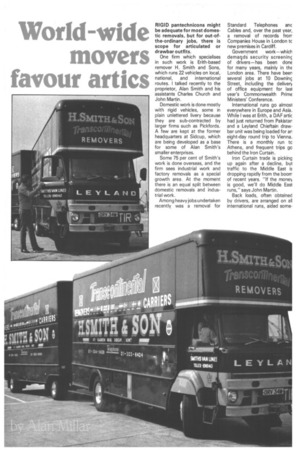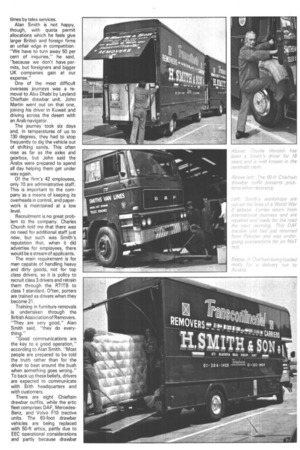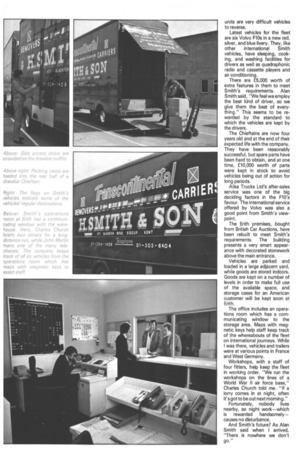World-wide movers favour attics
Page 52

Page 53

Page 54

If you've noticed an error in this article please click here to report it so we can fix it.
RIGID pantechnicons might be adequate for most domestic removals, but for out-ofthe-ordinary jobs, there is scope for articulated or drawbar outfits.
One firm which specialises in such work is Erith-based remover H. Smith and Sons, which runs 22 vehicles on local, national, and international routes. I talked recently to the proprietor, Alan Smith and his assistants Charles Church and John Martin.
Domestic work is done mostly with rigid vehicles, some in plain unlettered livery because they are sub-contracted by larger firms such as Pickfords. A few are kept at the former headquarters at Sidcup, which are being developed as a base for some of Alan Smith's smaller enterprises.
Some 75 per cent of Smith's work is done overseas, and the firm sees industrial work and factory removals as a special growth area. At the moment there is an equal split between domestic removals and industrial work.
Among heavy jobs undertaken recently was a removal for Standard Telephones anc Cables and, over the past year, a removal of records frorr Companies House in London tc new premises in Cardiff.
Government work—which demarlds security screeninc of drivers— has been done for many years, mainly in the London area. There have been several jobs at 10 Downinc Street, including the delivery of office equipment for last year's Commonwealth Prime Ministers' Conference.
International runs go almost everywhere in Europe and Asia. While I was at Erith, a DAF antic had just returned from Pakistar and a Leyland Chieftain drawbar unit was being loaded for an eight-day round trip to Vienna. There is a monthly run tc Athens, and frequent trips gc behind the Iron Curtain.
Iron Curtain trade is picking up again after a decline, but traffic to the Middle East is dropping rapidly from the boorr of recent years. "If the money is good, we'll do Middle East runs," says John Martin.
Back loads, often obtained by drivers, are arranged on all international runs, aided some times by telex services.
Alan Smith is not happy, though, with quota permit allocations which he feels give larger British and foreign firms an unfair edge in competition. "We have to turn away 50 per cent of inquiries," he said, "because we don't have permits, but foreigners and bigger UK companies gain at our expense."
One of the most difficult overseas journeys was a re moval to Abu Dhabi by Leyland Chieftain drawbar unit. John Martin went out on that one, joining his driver in Kuwait and driving across the desert with an Arab navigator.
The journey took six days and, in temperatures of up to 130 degrees, they had to stop frequently to dig the vehicle out of shifting sands. This often rose as far as the axles and gearbox, but John said the Arabs were prepared to spend all day helping them get under way again.
Of the firm's 42 employees, only 10 are administrative staff.
This is important to the cornpany as a means of keeping its overheads in control, and paperwork is maintained at a low level.
Recruitment is no great problem to the company. Charles Church told me that there was no need for additional staff just now, but such was Smith's reputation that, when it did advertise for employees, there would be a stream of applicants: The main requirement is for men capable of handling heavy and dirty goods, not for top class drivers, so it is policy to recruit class 3 drivers and retrain them through the RTITB to class 1 standard. arten, porters are trained as drivers when they become 21.
Training in furniture removals is undertaken through the British Association of Removers. "They are very good," Alan Smith said, "they do everything."
"Good communications are the key to a good operation," according to Alan Smith. "Most people are prepared to be told the truth rather than for the driver to beat around the bush when something goes wrong." To back up these beliefs, drivers are expected to communicate with Erith headquarters and with customers.
There are eight Chieftain drawbar outfits, while the artic fleet comprises DAF, Mercedes Benz, and Volvo F10 tractive units. The 60-foot drawbar vehicles are being replaced with 50-ft artics, partly due to EEC operational considerations and partly because drawbar units are very difficult vehicles to reverse.
Latest vehicles for the fleet are six Volvo FlOs in a new red, silver, and blue livery. They, like other international Smith vehicles, have sleeping, cook ing, and washing facilities for drivers as well as quadraphonic radio and cassette players and air conditioning.
There are £5,000 worth of extra features in them to meet Smith's requirements. Alan Smith said, "We feel we employ the best kind of driver, so we give them the best of everything." This seems to be rewarded by the standard to which the vehicles are kept by the drivers.
The Chieftains are now four years old and at the end of their expected life with the company.
They have been reasonably successful, but spare parts have been hard to obtain, and at one time, £10,000 worth of parts were kept in stock to avoid vehicles being out of action for long periods.
Ailsa Trucks Ltd's after-sales service was one of the big deciding factors in the FlO's favour. The international service offered by Volvo was also a good point from Smith's viewpoint.
The Erith premises, bought from British Car Auctions, have been rebuilt to meet Smith's requirements. The building presents a very smart appearance with decorated stonework above the main entrance.
Vehicles are parked and loaded in a large adjacent yard, while goods are stored indoors.
Goods are kept on a number of levels in order to make full use of the available space, and storage cases for an American customer will be kept soon at Erith.
The office includes an operations room which has a com municating window to the storage area. Maps with magnetic keys help staff keep track of the whereabouts of the fleet on international journeys. While I was there, vehicles and trailers were at various points in France and West Germany.
Workshops, with a staff of four fitters, help keep the fleet in working order. "We run the workshops on the lines of a World War II air force base," Charles Church told me. "If a lorry comes in at night, often it's got to be out next morning."
Fortunately, nobody lives nearby, so night work—which is rewarded handsomely— causes no disturbance.
And Smith's future? As Alan Smith said when I arrived, "There is nowhere we don't go."




































































































































































